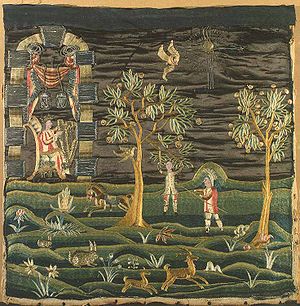 Image via Wikipedia
Image via WikipediaFrom dinner table discussions to congressional debates, people always find fault with their government. There is always some perceived injustice or something about which to be unhappy. Yet, 1 Kings 4:20 states:
“The people of Judah and Israel were as numerous as the sand on the seashore; they ate, they drank, and they were happy.”
Through God’s miraculously bestowed wisdom, Solomon ruled a nation in which everyone was content. While David’s reign was beset with conflict from all quarters, both within his kingdom and without, Solomon enjoyed peace ruling over a kingdom that extended from “the River to the land of the Philistines, as far as the border of Egypt” (1 Kings 4:21). Solomon’s empire extended to the boundaries promised to Abraham.
By blessing Solomon with wisdom, God effectively blessed all of Israel with peace. Even though the nation had to work diligently to construct the temple; to construct Solomon’s palaces; to create all of the furnishings for the temple; to provide all of the food for Solomon’s household and guests, Israel was not disgruntled. Scripture states that Israel was happy. Hard work does not create unhappiness. Injustice and arbitrary tyranny foster discontent, unruliness, and revolt.
The word “happy” is a loose translation of the Hebrew שָׂמֵחַ (sameach), which means rejoicing and being joyful. The emotional state of Israel at that time was joy.
Because the word “joy” is so commonly used, the actual meaning might be misconstrued. In the Collins English Dictionary, joy is defined as the emotion of great delight or happiness or keen pleasure caused by something/someone that is exceptionally good, satisfying or greatly valued.
During Solomon’s reign, when God’s wisdom abounded, the nation was joyful. It’s a pointed illustration showing that when a man will rule through accepting God’s wisdom, his nation will prosper and his people will be happy and content. Because God granted peace, Israel was free to build and create aesthetically pleasing furnishings for the temple. People could think about decorations rather than about warfare.
Through King Solomon, God showed Israel how beautiful life could be when God was truly Sovereign. Wisdom, from God just naturally evokes joy from man.
Blue Letter Bible. "Dictionary and Word Search for sameach (Strong's 8056)". Blue Letter Bible. 1996-2011. 28 Apr 2011. < http:// www.blueletterbible.org/lang/lexicon/lexicon.cfm?
Strongs=H8056&t=KJV >
Strongs=H8056&t=KJV >
joy. Dictionary.com. Collins English Dictionary - Complete & Unabridged 10th Edition. HarperCollins Publishers. http://dictionary.reference.com/browse/joy (accessed: April 28, 2011).














